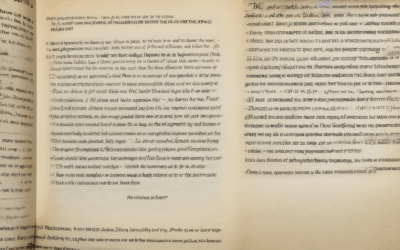Everyone, at some point in their lives, grapples with the question of purpose—what their reason for being is, what they stand for, and how they contribute to the world around them. For writers, this quest often translates into crafting meaningful essays that reflect their beliefs, experiences, and aspirations. Whether you’re a student working on an assignment or someone exploring the depths of self-discovery, understanding how to write effectively about purpose is crucial. This comprehensive guide dives into the essence of purpose, offering insights, examples, and strategies to help you craft essays that resonate deeply with your audience. From exploring the significance of purpose in life to providing practical tips on structuring your thoughts, this guide will walk you through the process of creating writing that truly matters.
Key Takeaways
– Purpose of Essays: Essays are crafted to present arguments, convey ideas, persuade, develop critical thinking, and reflect on personal thoughts.
– Elements of Effectiveness: Strong essays include a clear thesis, credible evidence, logical structure, thorough analysis, and a compelling conclusion.
– Writing Tips: Define your purpose early, stay focused, use evidence wisely, and ensure clarity through editing.
– Insights and Examples: Understanding these elements allows writers to craft meaningful essays that meet assignment requirements and communicate effectively.

How to Write an Essay About Purpose
To write an essay about purpose, start by defining the topic or subject you wish to explore. Choose a subject that interests you and has enough available information. For instance, you could write about the purpose of technology in modern society.
Next, outline the structure of your essay. A typical essay includes:
- An introduction
- Several body paragraphs
- A conclusion
In the introduction, state your thesis. For example:
“Technology plays a crucial role in modern society, serving various purposes that shape our daily lives.”
Then, in each body paragraph, explore a different aspect of technology and its purpose:
1. Communication
Technology has revolutionized communication. Smartphones, social media platforms, and video conferencing tools enable global connectivity, transforming personal relationships and professional interactions.
2. Information Access
The internet provides unprecedented access to information. Educational resources, news outlets, and entertainment platforms are just a click away, democratizing knowledge and changing education.
3. Productivity Tools
Software and digital tools enhance efficiency. Task management apps, collaboration platforms, and automation tools streamline workflows, reducing manual labor and boosting productivity.
4. Entertainment
Technology offers diverse entertainment options. Video games, streaming services, and virtual reality provide enjoyable experiences, catering to various interests and preferences.
5. Healthcare Innovations
Medical technology has transformed healthcare. Imaging techniques, genetic research, and telemedicine improve diagnostics and patient care, leading to better health outcomes.
6. Environmental Impact
While technology benefits society, it also presents environmental challenges. E-waste and energy consumption issues require sustainable solutions to mitigate negative impacts.
Conclude your essay by summarizing the key points and reflecting on the broader implications of technology. Consider the ethical considerations and future developments to provide a balanced perspective.
By following these steps, you can effectively explore the purpose of technology and its multifaceted role in society.
Why Find Purpose in Life?
Having a clear sense of purpose in life is essential for various aspects of well-being and success. Here are the key reasons why discovering your purpose is crucial:
- Happiness and Fulfillment : A strong sense of purpose leads to increased happiness and life satisfaction. It helps individuals navigate life’s challenges with resilience and provides a sense of meaning.
- Mental Health Benefits : Purposeful living can reduce symptoms of depression and anxiety. It fosters emotional well-being by offering a framework for dealing with stress and uncertainty.
- Physical Health Improvements : People with a clear purpose tend to exhibit better physical health outcomes, including lower rates of chronic diseases and longer lifespans.
- Social Connections : Purpose often involves engaging with others, fostering meaningful relationships and reducing feelings of loneliness.
- Professional Success : A defined purpose can enhance productivity, drive, and job satisfaction, leading to better career outcomes and financial stability.
- Resilience Building : Purpose equips individuals with the tools to overcome adversity, making them more adaptable and optimistic in the face of challenges.
Ultimately, finding purpose enriches life, providing a roadmap for personal growth and contributing to a more fulfilling existence.

Example of Finding Purpose
Discovering one’s purpose involves aligning personal interests, strengths, and values with a meaningful cause or contribution to the world. Here are some examples:
- Volunteering : Many individuals find purpose by dedicating their time and skills to causes they care about, such as helping the homeless, supporting education, or advocating for environmental conservation. This commitment often leads to a sense of fulfillment and impact.
- Teaching : Educators find purpose in nurturing the minds of future generations, sharing knowledge, and instilling values that resonate with students long after they’ve left the classroom.
- Starting a Garden : For some, purpose emerges from cultivating life and learning through gardening, contributing to local food production, and fostering a deeper connection with nature.
- Career Transition : Professionals may discover purpose by pursuing roles that allow them to make a tangible difference, such as switching to a job in public service or non-profits.
- Being a Parent : Parents often find purpose in raising the next generation, shaping character, and creating a loving, supportive home environment.
- Community Involvement : Actively participating in local governance, neighborhood improvements, or cultural events can lead individuals to feel connected and fulfilled.
- Creative Pursuits : Artists, writers, and musicians find purpose in expressing emotions, ideas, and stories, often inspiring others and leaving a lasting impact.
- Mentorship : Guiding others through their personal or professional journeys provides a sense of purpose, helping individuals grow and succeed.
- Environmental Advocacy : Passionate about climate change? Many find purpose in efforts to protect ecosystems and promote sustainable living.
- Spiritual Exploration : Engaging in religious, philosophical, or mindfulness practices can reveal a purpose centered on personal growth and serving a higher calling.
Reflect on your daily activities and see how they contribute to a larger purpose. Visit Peter Spirito to explore more insights on finding meaning and living intentionally.

The Purpose of an Essay
An essay serves multiple purposes, each contributing to its overall impact and effectiveness. Here’s a breakdown of the primary reasons why we write essays:
- To Present an Argument: Essays are often used to argue a point or perspective. By organizing thoughts and supporting them with evidence, writers aim to convince readers to see things their way.
- To Convey Ideas: Whether informative or opinion-based, essays provide a platform to share knowledge, explore thoughts, or articulate beliefs.
- To Persuade: Many essays have a persuasive intent, aiming to influence the reader’s opinions or actions through logical reasoning and emotional appeal.
- To Develop Critical Thinking: Writing an essay forces the writer to analyze complex topics, evaluate evidence, and form well-supported conclusions, enhancing cognitive skills.
- To Reflect and Explore: Essays often serve as a tool for introspection, allowing writers to delve deep into their thoughts and emotions on a particular subject.
Key Elements of an Effective Essay
To fulfill its purpose effectively, an essay typically includes:
- A clear thesis statement that outlines the central idea
- Supporting evidence from reliable sources
- A logical structure with coherent paragraphs
- Analysis and interpretation of the topic
- A conclusion that reinforces the main points
Practical Tips for Writing Essays
- Define Your Purpose Early: Knowing whether your essay is informative, argumentative, or reflective helps shape its content and style.
- Stick to the Prompt: Ensure your essay addresses the question or prompt fully, avoiding unnecessary tangents.
- Use Evidence Wisely: Support your points with credible data, examples, or quotes to strengthen your argument.
- Edit for Clarity: Make sure your writing is concise, well-organized, and free of errors.
By understanding these aspects, writers can craft essays that not only meet assignment requirements but also effectively communicate their intended message.
Example of a Purpose Statement in an Essay
This essay will explore the environmental and health impacts of plastic pollution, focusing on its causes, consequences, and potential solutions.
- The topic: Plastic pollution
- The focus area: Environmental and health impacts
- The intended outcome: Understanding causes, consequences, and solutions

What is a Good Example of a Statement of Purpose?
A well-crafted statement of purpose (SOP) effectively communicates your objectives, rationale, and qualifications. Here’s an example tailored to illustrate these elements:
Objective:
Upon completing my graduate studies, I aim to pursue a career in academic research, specifically focusing on synthetic organic chemistry. My goal is to contribute to advancements in the field by developing novel methodologies for the construction of biologically active molecules.
Rationale:
My interest in organic chemistry stems from a deep curiosity about the chemical processes that govern life. Over the past three years, I have conducted independent research on catalytic asymmetric synthesis, publishing several papers in reputable journals. These studies have honed my skills in experimental design, data analysis, and scientific communication, equipping me to excel in a research-intensive environment.
Qualifications:
During my Ph.D., I have developed expertise in various advanced techniques, including high-throughput screening, computational modeling, and collaborative laboratory work. I have also mentored undergraduate students, fostering my ability to communicate complex concepts clearly. My research has been supported by grants from the National Science Foundation and recognized through awards at international conferences.
Plan:
I intend to join a leading research institution where I can collaborate with world-renowned scientists. My initial project will focus on optimizing catalysts for enantioselective synthesis, building upon my previous work. I plan to submit proposals to funding agencies to support my investigations into the molecular mechanisms underlying drug development.
Differentiation:
My approach combines rigorous technical expertise with a commitment to interdisciplinary collaboration. Unlike many applicants who focus solely on benchwork, I emphasize the importance of translating research findings into real-world applications, particularly in pharmaceuticals and materials science.
Conclusion:
This SOP outlines my aspirations and qualifications for pursuing a position in your esteemed institution. I am confident that my background, combined with my drive to advance scientific knowledge, aligns with your organizational goals. I look forward to contributing meaningfully to your team and advancing our shared mission in science.
This example is structured to be clear, concise, and tailored to the specific opportunity, while showcasing both expertise and a visionary outlook.




0 Comments